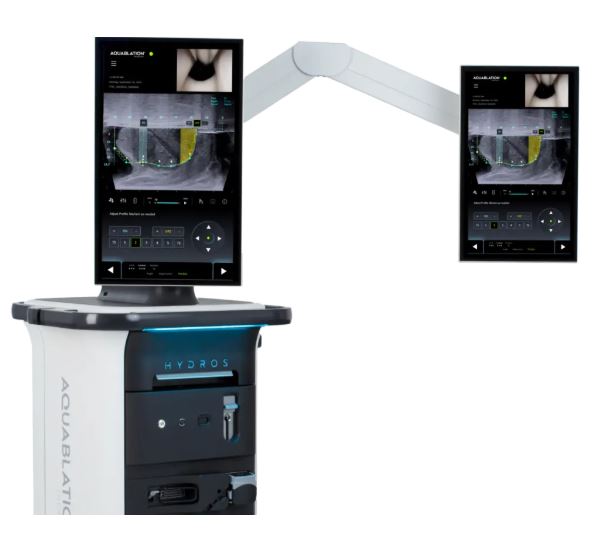Urology
Urology services at McKenzie-Willamette Medical Center focus on the urinary tract and system, including the bladder and kidneys, of both men and women, as well as the male reproductive organs.
Aquablation Therapy: Surgical Treatment for BPH (enlarged prostate)
Aquablation therapy is a new type of surgical treatment for benign prostatic hyperplasia (BPH). Aquablation is the only image-guided, heat-free, automated robotic therapy for BPH. The robotic-assisted procedure uses a heat-free waterjet and real-time image guidance allowing for greater precision and accuracy. It is precise, consistent, and predictable, and provides long-term BPH relief without compromise. The procedure can be performed on any shape and size prostate. At McKenzie-Willamette Medical Center, we are proud to offer this advanced, minimally invasive treatment.
Choosing a treatment option can be overwhelming, as it often forces men to compromise in some way. Oftentimes, this could mean not responding well to medication, or choosing a treatment with undesirable side effects, such as urinary incontinence, or sacrificing sexual function. Aquablation therapy is a one-of-a-kind procedure that aims to minimize this compromise.

What is Aquablation Therapy?
Aquablation therapy uses the power of water delivered with robotic precision to provide long-lasting BPH relief without compromise. It is precise, consistent, and predictable, and provides long-term relief no matter how large your prostate.
How Does Aquablation Therapy Work?
Aquablation therapy is a resective procedure, which means that the prostate tissue causing symptoms is surgically removed. No incision is made in the abdomen, as the prostate is reached through the urethra.
Aquablation therapy is performed in a hospital and is done under anesthesia. The procedure typically takes less than an hour and involves an overnight stay.
What are the Side Effects of Aquablation Therapy?
TPMG Urologists know the primary reason men are delaying surgery is because they are concerned about side effects.1 In fact, a recent survey shows that 85% of men are concerned that surgery will cause incontinence, and 4 out of 5 men are concerned that surgery will have a permanent impact on their sexual function.
In clinical studies, men who had Aquablation therapy had a very low rate of irreversible complications—incontinence, ejaculatory dysfunction, and erectile dysfunction.
Is Aquablation Therapy Right for You?
Aquablation therapy is a different kind of surgical procedure. There are three reasons it may be right for you, but make sure to discuss with your Urologist to see if you’re a good candidate.
Dr. Brenton Sherwood
Board-certified Urologist credentialed with McKenzie-Willamette Medical Center
Aquablation Recovery
As with most BPH procedures, you will wake up with a catheter. Patients typically stay overnight in the hospital. We may send you home with a catheter for a few days or may keep you an additional night in the hospital if you are unable to pee on your own or empty your bladder at the time of discharge.
We know that no one likes staying overnight in a hospital. However, the benefit of Aquablation therapy is that most patients end up leaving the hospital without a catheter.
Once you are home, you may experience mild burning during urination for a couple of weeks. This can be managed with mild pain medication.
For more information, visit aquablation.com/safety-information.
To schedule an Aquablation Therapy consult for the treatment of BPH, call Oregon Urology Institute at 541.334.3350 and visit Aquablation.com for Frequently Asked Questions.
For More Information
Call 541
Related Services and Conditions
Cystoscopy
At McKenzie-Willamette Medical Center, we work hard to see the big picture. A Cystoscopy helps. By placing a small camera inside the bladder, doctors are able to see a very detailed view (including things that may not be visible in an x-ray), and take samples of...
Laser Lithotripsy
Living with kidney stones can be quite painful. But with newer, minimally invasive treatments, removing them doesn’t have to be. Urologists at McKenzie-Willamette Medical Center specialize in laser lithotripsy – an incision-free procedure that uses a laser to break...
Prostate Cancer
More than 90 percent of all prostate cancers are discovered while they are either localized (confined to the prostate) or regional (nearby). The five-year survival rate for men diagnosed with prostate tumors discovered at these stages is nearly 100 percent. In the...
Sling Surgery for Incontinence
Urinary incontinence — the loss of bladder control — is a common and often embarrassing problem. The severity of urinary incontinence ranges from occasionally leaking urine when you cough or sneeze to having an urge to urinate that's so sudden and strong you don't get...




